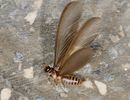Pest Management Science (2019) 75, 3135-3143
From Pestinfo-Wiki
 | Selected publication you are invited to contribute to the discussion section (above tab) |
Advances in insect phototaxis and application to pest management: a review
Pest Management Science 75 (12), 3135-3143
Abstract: Many insects, especially nocturnal insects, exhibit positive phototaxis to artificial lights. Light traps are currently used to monitor and manage insect pest populations, and play a crucial role in physical pest control. Efficient use of light traps to attract target insect pests is an important topic in the application of integrated pest management (IPM). Phototactic responses of insects vary among species, light characteristics and the physiological status of the insects. In addition, light can cause several biological responses, including biochemical, physiological, molecular and fitness changes in insects. In this review, we discuss several hypotheses on insect phototaxis, factors affecting insect phototaxis, insect-sensitive wavelengths, biological responses of insects to light, and countermeasures for conserving beneficial insects and increasing the effect of trapping. In addition, we provide information on the different sensitivities to wavelengths causing positive phototactic behavior in > 70 insect pest and beneficial insect species. The use of advanced light traps equipped with superior light sources, such as light-emitting diodes (LEDs), will make physical pest control in IPM more efficient.
(The abstract is excluded from the Creative Commons licence and has been copied with permission by the publisher.)
Link to article at publishers website
Database assignments for author(s): Qiu-Ying Huang, Chao-Liang Lei
Research topic(s) for pests/diseases/weeds:
pheromones/attractants/traps
Pest and/or beneficial records:
| Beneficial | Pest/Disease/Weed | Crop/Product | Country | Quarant. |
|---|